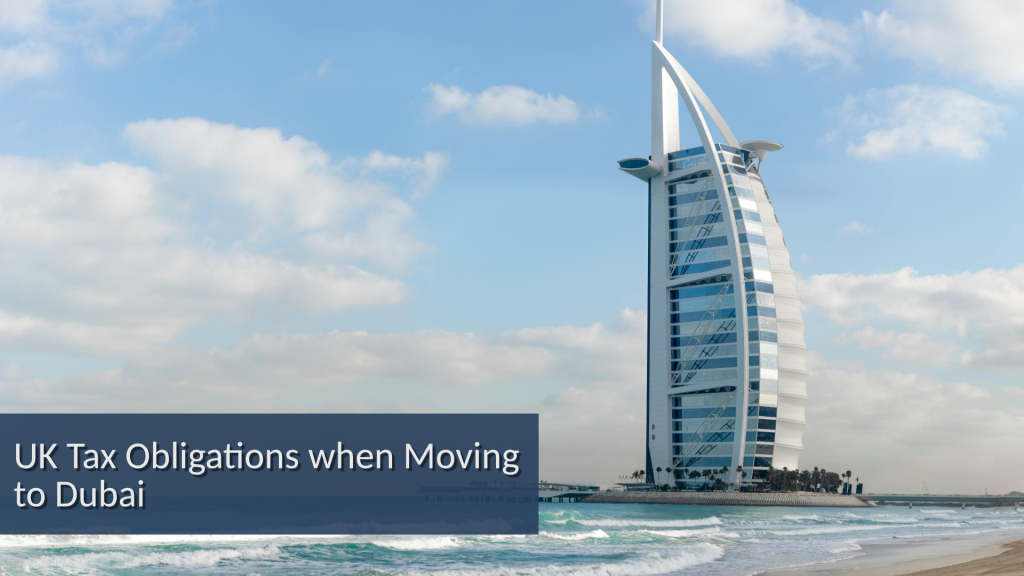Dubai offers sunshine, zero income tax, and a vibrant lifestyle. No wonder so many UK business owners, property investors, and entrepreneurs are making the move. But before you pack your bags and wave goodbye to drizzle, there’s one thing you can’t leave behind so easily: your UK tax obligations.
Relocating abroad doesn’t automatically mean cutting tax ties with the UK and getting this wrong can cost you dearly. It’s crucial to understand how UK tax rules continue to affect you even after you leave so you protect your income, reduce your tax bill, and avoid unnecessary stress. At GoldHouse, we help clients navigate the UK–Dubai tax landscape with clarity, confidence, and long-term strategy.
When Do You Stop Paying UK Tax?
The answer depends on whether you’re officially classed as non-resident for tax purposes and that’s determined by the Statutory Residence Test (SRT).
The SRT considers:
- How many days you spend in the UK
- Whether you have a UK home
- Where you work and earn income
- Personal ties (family, property, etc.)
You generally need to spend fewer than 183 days in the UK per tax year and meet certain conditions to be considered non-resident. But even once you qualify, it doesn’t mean you’re off the hook entirely…
What UK Income You May Still Be Taxed On
Even if you’re non-resident, you may still owe tax on UK-based income, including:
- Rental income from UK property
- UK dividends and interest (in some cases)
- Employment income linked to UK duties
- Pensions and annuities
- UK-based business profits
While Dubai doesn’t tax income, HMRC still does if it’s sourced in the UK and not planning for this can leave you facing an unexpected tax bill.
Capital Gains Tax (CGT): Selling UK Assets
You may still be liable for UK Capital Gains Tax if you sell UK assets, such as:
- Buy-to-let properties
- UK shares or business interests
If you’re non-resident and sell residential property in the UK, you’ll still need to report and possibly pay CGT within 60 days of sale. Other asset rules vary depending on how long you’ve been non-resident, so getting advice is essential.
Inheritance Tax and the New Long-Term Residency Rules for Expats
Leaving the UK no longer automatically ties your entire estate to UK Inheritance Tax (IHT) but the rules have changed significantly, especially for long-term expatriates. Historically, “domicile” was the deciding factor, meaning many Brits living abroad were still classed as UK-domiciled and faced a 40% IHT charge on their worldwide estate.
Now, under the new Long-Term Residency (LTR) rules, domicile is being replaced by a residency-based test. If you’ve lived outside the UK for at least 10 of the last 20 years, you may now be treated as a non-UK long-term resident. In practical terms, this means your non-UK assets could be exempt from UK IHT, while only UK-based property, pensions, and investments remain within the tax net.
For those who don’t meet the non-residency criteria at death, the entire estate will still be subject to UK IHT under the traditional thresholds and exemptions.
This makes early planning essential. British expats who intend to remain abroad long-term should consider relocating assets outside of the UK and exploring strategies like trusts, SSAS pensions, and lifetime gifting to reduce exposure and protect family wealth. Understanding and acting on these changes can have a significant impact on your legacy.
Do You Need to File a UK Tax Return?
Yes, in many cases, even if you’re non-resident, you’ll still need to:
- File a Self Assessment tax return
- Report UK rental income or business profits
- Claim double taxation relief, if applicable
- Disclose disposals of UK assets
Failing to file correctly or on time can lead to fines and unnecessary HMRC attention.
Tips for a Smooth Financial Transition
Before (and after) you move, we recommend:
- Reviewing your residency status annually
- Keeping detailed records of days in the UK
- Structuring income sources strategically
- Considering limited companies or offshore options
- Making use of tax-efficient vehicles like SSAS pensions
- Getting clarity on business setup in Dubai (the rules differ by free zone and sector)
The earlier you plan, the more opportunities you have to reduce tax, protect assets, and grow wealth internationally.
Why Professional Advice Matters
Dubai may feel like a clean slate but your UK financial footprint follows you. Getting the tax rules wrong can lead to penalties, double taxation, and missed opportunities to protect your wealth.
At GoldHouse Accounting, we specialise in helping UK business owners and expats build smart cross-border strategies. Whether you’re moving to Dubai, investing in UK property, or scaling an international business, we’ll help you stay compliant, keep more of what you earn and plan for legacy.
Thinking of moving or already in Dubai and unsure where you stand? Book a strategy call with GoldHouse today. We’ll help you transition with clarity, confidence, and a long-term plan for freedom, family, and financial growth.



